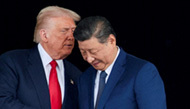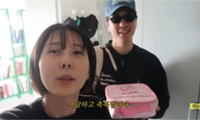Staff Reporter
The lonesome passing of Yi Ku, the only surviving son of Choson’s last crown prince, last Saturday has awakened the public to the long forgotten tribulation of the disgraced royal family.
Bereaved family members carry the coffin of the late Yi Ku, the only surviving son of Choson’s last crown prince Yongchin, from Incheon International Airport in Inchon, Kyonggi Province, Wednesday. Yi’s body was brought back from Tokyo, where he died Saturday. /Korea Times
During the Japanese occupation (1910-1945), the royal family endured constant intimidation by Japanese imperialists including the murder of Queen Myongsong, their mother or grandmother, by Japanese hooligans. After Korea’s liberation in 1945, President Syngman Rhee suppressed the royal family to prevent the restoration of the monarchy. Rhee seized and nationalized most of the family’s properties.
The family also had to shoulder the psychological and historical burden of their ancestors’ responsibility for the ``collapse of the nation.’’
Stripped of most of wealth and authority, many members of the family secluded themselves from the ``merciless’’ world, even from other family members. Some flew to the U.S. in desperate effort to disown their ancestors.
In his lifetime, Yi Ku was known to often say, ``I am only an individual called `Yi Ku.’ I do not want to see this type of life again.’’
At the beginning of the royal tragedy, King Kojong, the grandfather of Yi Ku, had nine princes and four princesses, but only three princes survived childhood: the second son ``Chok,’’ the sixth son ``Kang’’ and the seventh son ‘`Un.’’
The second son became King Sunjong, the last monarch of the kingdom. As Sunjong left no children, the seventh son Prince Yongchin became the crown prince. His elder brother Prince Uichin should have taken the position but was passed over because Yongchin’s mother Lady Om had a higher status in the court than Uichin’s mother Lady Chang.
After King Sunjong died in 1926, Prince Yongchin was called ``King Yi,’’ a nominal title because Choson had already lost its sovereignty to Japan.
Prince Yongchin married Masako Nashimoto, a member of Japan’s imperial family. She, once one of three candidates for then Japan’s next empress, was instead designated as Yi’s wife, as a medical test indicated she could be barren. Some media claimed that the arranged marriage was Japan’s imperialist conspiracy to terminate the Choson’s royal lineage.
However, Yi’s wife Nashimoto, who later adopted a Korean name Lady Yi Pang-ja, gave birth to Yi Ku in 1931.
After liberation, the royal family could not come back to Korea, as South Korea’s first President, Rhee, feared that the royal family’s comeback would challenge his emerging authority as the new republic’s founding father.
This file photo, assumed to be taken in 1915 at Changdok Palace, shows the following royal family members, from left: Prince Uichin, the sixth son of Kojong; King Sunjong, the second son and the last monarch of Choson; Prince Yongchin, the seventh son; then former King Kojong; Queen Yundaebi, wife of Sunjong; Tokindang Kimbi, wife of Uichin; and Yi Kon, the eldest son of Uichin. The seated child in the front row is Princess Tokhye, the only daughter of Kojong.
/ Korea Times
It was only 1963 that a new president Park Chung-hee, allowed the royal family their long-sought return to Korea. However, they could only stay at a small residence called ``Naksonjae,’’ in a corner of Changdok Palace. Prince Yongchin died seven years later in disgrace after long suffering diseases.
Yi Ku was also forced by other family members to divorce his American wife Julia Mullock against their will in 1982 due to her sterility. A series of business failures left him without support and so he died alone at a hotel in Tokyo last Saturday. The site of the hotel was his birthplace 74 years ago.
King Kojong’s sixth son, Prince Uichin, gave birth to 13 sons and nine daughters from 14 women. With an extremely wide range of historical evaluations over him - womanizer and behind-the-scene leader of the independent movement - the Japanese authorities tied the hands of the prince throughout the occupation.
Unlike Prince Yongchin, who spent most of his life in Japan and the United States, President Rhee’s seizure of the royal properties deprived Prince Uichin of most of his wealth.
Afterwards, many of the family members had to swallow the disgrace of working for a living. According to the prince’s 11th son, Seok, his mother Hong Chong-sun had to sell noodles as a street vendor.
However, despite their suffering, most family members have not been able to adapt themselves to the new fast-changing capitalistic Korea. To make matters worse, many people swindled them. One family member admitted in a recent interview with a daily newspaper that her sons could not find honest work since many con men approached them and promised a ``windfall’’ by bringing back the lost wealth of the royal family through legal procedures or other means.
``Many of the family members did not know how to earn money. They were just innocent and credulous, which some people just exploited,’’ said Hye-won, son of Yi Hae-jong, ninth son of Prince Uichin.
News articles occasionally have drawn public attention to the remaining members since then. In 1998, it was reported that Ui-chin’s eight son Kyong-gil died alone in a social center in eastern Seoul, and last year, the eleventh son Seok was found homeless. (He recently got a job as a lecturer at a university in Chonju.)
Among Uichin’s surviving four sons and seven daughters, four have lost touch with the family after they left for the United States. The other family members hold an ancestral ritual two times a year for Prince Uichin, but usually only two or three of the 11 surviving siblings attend the ceremonies, according to Hye-won.
kkt@koreatimes.co.kr
스마터리빙
more [ 건강]
[ 건강]이제 혈관 건강도 챙기자!
[현대해운]우리 눈에 보이지 않기 때문에 혈관 건강을 챙기는 것은 결코 쉽지 않은데요. 여러분은 혈관 건강을 유지하기 위해 어떤 노력을 하시나요?
 [ 건강]
[ 건강]내 몸이 건강해지는 과일궁합
 [ 라이프]
[ 라이프]벌레야 물럿거라! 천연 해충제 만들기
 [ 건강]
[ 건강]혈압 낮추는데 좋은 식품
[현대해운]혈관 건강은 주로 노화가 진행되면서 지켜야 할 문제라고 인식되어 왔습니다. 최근 생활 패턴과 식생활의 변화로 혈관의 노화 진행이 빨라지고
사람·사람들
more많이 본 기사
- ‘AI 대부’ 제프리 힌턴 “오픈AI·메타, AI 안전보다 이익 중시”
- 진보 간판 샌더스 “부유한 자들이 AI 밀어붙여” 쓴소리
- 정용진 신세계그룹 회장 “비상할 준비… 1
- 특검 “김건희, 장막 뒤에서 불법 국정개입…尹과 정치공동체”
- 트럼프, 4주년 앞둔 우크라전 終戰불씨 살리나…진전·한계 병존
- 장거리 여행 중에도 입시 준비… ‘오디오북·교육앱·팟캐스트’로
- 뉴욕·북유럽에 눈폭풍…잇단 항공편 결항에 교통대란
- 美서 스마트폰 ‘부모통제’ 기능으로 납치 청소년 구조
- 佛배우 브리지트 바르도 별세…생전 韓보신탕 문화 비판
- 李대통령, 12·29 참사에 “대통령으로서 사죄…유가족 종합지원”
- 이혜훈 “韓경제 ‘회색코뿔소’ 상황…미래안목 기획·예산 연동”
- ‘정계은퇴선언’ 펠로시 “중간선거서 민주당이 하원 다수당 될것”
- 中, 9개월만에 ‘대만포위’ 훈련… “외곽차단 등 실전능력 검증”
- 초유의 ‘3특검’ 활동 종료…헌정사 첫 전직 대통령부부 동반기소
- “13초만에 수백만 달러 매출” 방탄소년단 뷔 3분 라이브 방송이 만든 크리스마스의 기적
- 정석원, ♥백지영과 수입 격차 언급하더니.. “전역 반지까지 팔아”
- ‘친형 구속’ 박수홍, 그 다음은 ‘198억 손해배상’
- 충격 진단 “네이마르 이미 끝났다, 몸 심각하게 손상”... ‘식단 문제·훈련 부족’ 지적 “월드컵? 너무 늦었다”
- 李대통령, 오늘 청와대 첫 출근… ‘용산 시대’와 결별
- ‘마이큐♥’ 김나영, 재혼 두달 만에 큰 결심.. “한부모 가정에 1억원 기부”
- 웨스트브룩, 존슨 앞질러 NBA 통산 어시스트 7위… 팀은 탈꼴찌
- 고금리·고가격·관세 ‘브레이크’… 신차 시장 썰렁
- ‘180일 질주’ 김건희특검 수사결과 발표…20명 구속·66명 기소
- 北, 장거리순항미사일 발사…김정은 “핵무력 무한대 발전 총력”
- 트럼프 “돈바스 일부 의견접근”…젤렌스키 “안전보장 거의 합의”
- 뉴저지서 헬기 2대 공중 충돌… “최소 1명 사망”
- 삼보일배·108배…집회도 대통령 따라 다시 청와대 앞으로
- ‘정신건강 위험’ 비판받은 오픈AI, AI 안전 책임자 다시 모집
- 시니어들 상황별 리버스모기지의 선택
- “케데헌이 없애준 장벽… “ WSJ ‘미국인 사로잡은 K팝’ 조명
- 韓, 이번주 안보리 이사국 2년 임기종료…외교지평 확대 평가
- 트럼프 “종전협상 마지막 단계”…젤렌스키 “신속한 평화 오길”
- 러시아 “대만해협 긴장 고조시 중국 지지…대만은 中 일부”
- 뉴욕에 3년만에 최대 폭설…이틀째 항공·도로 대란
- 국힘, 이혜훈 발탁에 최고위 열어 ‘제명’… “배신” 비난 쏟아져
- “내년 미중관계 4대 화약고는 대만·콩·수출통제·군사굴기”
- 중도보수 중량급 인사 중용…李대통령 ‘실용주의 용인술’ 재부각
- “지금은 하늘에... 아빠가 뛰던 곳이란다” 故 조타 아들 둘, 반 다이크 ‘손 꼭 붙잡고’ 안필드 찾았다
- 트럼프, 태국-캄보디아 휴전에 “미국이 기여…유엔, 도움안돼”
- “개인 선정은 SON이 유일?” 손흥민, 축구계 8대 기적 선정이 더 대단한 이유 “퀴라소 월드컵 진출보다 멋져”
- 올해 美 기업 파산신청 증가… “관세·고물가·고금리 원인”
- 트럼프, 젤렌스키와 회동 앞서 “푸틴과 생산적인 통화했다”
- 180일간 김건희만 판 특검 오늘 수사 종료…’V0’ 단죄 성과
- 쿠팡 김범석, 30~31일(한국시간) 연석청문회 또 불출석 의사… “일정 있어”
- ‘AI 조작 번복’ 폭로자 vs ‘유재석 패싱’ 이이경..하차 잔혹사로 번진 사생활 논란 [2025 연말결산]
- “올해 최고 주목받은 테크 거물은 머스크 아닌 래리 엘리슨”
- 뉴욕시 폭설에 항공기 수천편 취소·지연 사태
- ‘통일교 자금관리’ 한학자 前비서실장 재소환…피의자 전환
- 이이경·조세호 다 떠나고..유재석 곁엔 결국 ‘무도’ 인연이었다
- 마지막 토요일도 도심 집회… “내란 … 6
1/5지식톡

-
 미 육군 사관학교 West Poin…
0
미 육군 사관학교 West Poin…
0https://youtu.be/SxD8cEhNV6Q연락처:wpkapca@gmail.comJohn Choi: 714-716-6414West Point 합격증을 받으셨나요?미 육군사관학교 West Point 학부모 모…
-
 ☝️해외에서도 가능한 한국어 선생님…
0
☝️해외에서도 가능한 한국어 선생님…
0이 영상 하나면 충분합니다!♥️상담신청문의♥️☝️ 문의 폭주로 '선착순 상담'만 진행합니다.☎️ : 02-6213-9094✨카카오톡ID : @GOODEDU77 (@골뱅이 꼭 붙여주셔야합니다…
-
 테슬라 자동차 시트커버 장착
0
테슬라 자동차 시트커버 장착
0테슬라 시트커버, 사놓고 아직 못 씌우셨죠?장착이 생각보다 쉽지 않습니다.20년 경력 전문가에게 맡기세요 — 깔끔하고 딱 맞게 장착해드립니다!장착비용:앞좌석: $40뒷좌석: $60앞·뒷좌석 …
-
 식당용 부탄가스
0
식당용 부탄가스
0식당용 부탄가스 홀세일 합니다 로스앤젤레스 다운타운 픽업 가능 안녕 하세요?강아지 & 고양이 모든 애완동물 / 반려동물 식품 & 모든 애완동물/반려동물 관련 제품들 전문적으로 홀세일/취급하는 회사 입니다 100% …
-
 ACSL 국제 컴퓨터 과학 대회, …
0
ACSL 국제 컴퓨터 과학 대회, …
0웹사이트 : www.eduspot.co.kr 카카오톡 상담하기 : https://pf.kakao.com/_BEQWxb블로그 : https://blog.naver.com/eduspotmain안녕하세요, 에듀스팟입니다…
케이타운 1번가
오늘의 1면
오피니언

새해 더 중요해지는 노동법 준수

연말연시, 안전하고 차분하게
 캐슬린 파커 워싱턴포스트 칼럼니스트
캐슬린 파커 워싱턴포스트 칼럼니스트 [캐슬린 파커 칼럼] 지미 라이의 마지막 희망
 유경재 나성북부교회 담임목사
유경재 나성북부교회 담임목사 [한국춘추] 미국의 힘
 전병두 서북미수필가협회 회원
전병두 서북미수필가협회 회원 [금요단상] 비자 발급
 박일근 / 한국일보 수석논설위원
박일근 / 한국일보 수석논설위원 [지평선] 스님의 주례사
 신상철 / 고려대 고고미술사학과 교수
신상철 / 고려대 고고미술사학과 교수 [미술 다시보기] 신의 모습을 닮고자 한 예술가
 스티브 강 전 한인민주당협회 회장
스티브 강 전 한인민주당협회 회장 [스티브 강 ‘인사이드 미국’] 2026 중간선거: 트럼프 지지율 하락이 말해주는 것
 김홍일 케이유니콘인베스트먼트 대표
김홍일 케이유니콘인베스트먼트 대표 [기고] 안정의 기준은 어떻게 제도가 되었나
1/3지사별 뉴스

물류거점창고에 불체자 8만명 수용 추진
도널드 트럼프 행정부가 이민자 구금·추방을 효율화하기 위해 전국 물류거점 창고에 8만명 규모의 수용시설 확보를 추진한다고 24일 워싱턴 포스트…
‘학자금 상환’ 안하면 임금압류

“온 세상에 희망·평화의 빛 스며들길”
가자지구와 우크라이나에서의 전쟁, 고립과 불평등으로 세상이 어지러운 가운데 워싱턴 지역 각급 한인교회와 성당들이 성탄절을 맞아 일제히 예배와 …
“연말은 스트레스·새해 결심은 없다”

“올해 최고 주목받은 테크 거물은 머스크 아닌 래리 엘리슨”
올해 미국에서 가장 주목받은 기술업계 거물은 일론 머스크 테슬라 최고경영자(CEO)가 아닌 래리 엘리슨 오라클 창업자·회장이라고 블룸버그 통신…
[새해부터 이렇게 달라진다] 최저임금 또 오르고… 유급 병가는 더 확대

오늘 하루 이 창 열지 않음 닫기 
























































.png)


댓글 안에 당신의 성숙함도 담아 주세요.
'오늘의 한마디'는 기사에 대하여 자신의 생각을 말하고 남의 생각을 들으며 서로 다양한 의견을 나누는 공간입니다. 그러나 간혹 불건전한 내용을 올리시는 분들이 계셔서 건전한 인터넷문화 정착을 위해 아래와 같은 운영원칙을 적용합니다.
자체 모니터링을 통해 아래에 해당하는 내용이 포함된 댓글이 발견되면 예고없이 삭제 조치를 하겠습니다.
불건전한 댓글을 올리거나, 이름에 비속어 및 상대방의 불쾌감을 주는 단어를 사용, 유명인 또는 특정 일반인을 사칭하는 경우 이용에 대한 차단 제재를 받을 수 있습니다. 차단될 경우, 일주일간 댓글을 달수 없게 됩니다.
명예훼손, 개인정보 유출, 욕설 등 법률에 위반되는 댓글은 관계 법령에 의거 민형사상 처벌을 받을 수 있으니 이용에 주의를 부탁드립니다.
Close
x